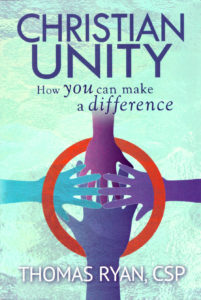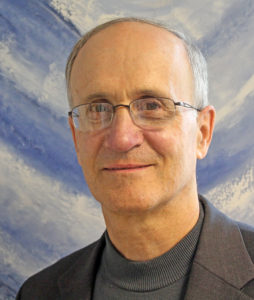Christian Unity: How You Can Make a Difference by Thomas Ryan, CSP
(Paulist Press; 2015)
 I first met Fr. Tom Ryan in 2014 when he was speaking at Calgary’s Ambrose University, as part of a week-long event called “Global Impact Week: Catholics and Evangelicals in God’s Mission Together”. The event at Ambrose was filled with thought-provoking presentations, and also with opportunities for conversation and discussion. I found Tom Ryan to be a very engaging and insightful part of it all, challenging us to continue to dialogue, and find ways to work together.
I first met Fr. Tom Ryan in 2014 when he was speaking at Calgary’s Ambrose University, as part of a week-long event called “Global Impact Week: Catholics and Evangelicals in God’s Mission Together”. The event at Ambrose was filled with thought-provoking presentations, and also with opportunities for conversation and discussion. I found Tom Ryan to be a very engaging and insightful part of it all, challenging us to continue to dialogue, and find ways to work together.
As a Jewish convert to Christianity, whose journey has been enriched in both Protestant and Catholic circles, it all made a lot of sense to me. So when I discovered that Ryan had written a new book called Christian Unity: How You Can Make A Difference, I hoped it would water the seeds that had been planted in my heart during that week at Ambrose. I wasn’t disappointed.
Tom Ryan has dedicated much of his life to fostering Christian unity: in campus ministry, as director of the Canadian Centre for Ecumenism, as co-founder and director of Unitas, and as founder of the Paulist North American Office for Ecumenical and Interfaith Relations, where he currently serves as director.
The book is much more than simply a “how-to” instruction guide for bringing Christians together, thought it does provide plenty of specific, practical ideas – such as hosting an ecumenical concert or organizing a speaker exchange program. Ryan also cites great examples of initiatives in congregations, parishes, the new monastics, religious communities, lay movements and social action groups. But I also appreciated his exploration of what is meant by “unity”, and his reminder of powerful Scripture verses on the topic. Jesus’ prayer during the Last Supper, in the presence of his disciples, clearly shows his desire in this regard:
“Holy Father, protect them in your name that you have given me, so that they may be one, as we are one… not only on behalf of these, but also on behalf of those who will believe in me through their word, that they may all be one. As you, Father, are in me and I am in you, may they also be in us so that the world may believe that you have sent me.” John 17:11, 15, 20-22.
St. Paul reiterates the vital importance of unity, and in fact seems to assume that there will be unity. Writing to the Ephesians, he implores them:
“I beg you to lead a life worthy of the calling…bearing one another with love, making every effort to maintain the unity of the Spirit in the bond of peace. There is one body and one Spirit, just as you were called to the one hope of your calling, one Lord, one faith, one baptism, one God and Father of all, who is above all and through all and in all.” Ephesisans 4:1-6
I also appreciated the theological underpinnings in the book that point us in the same direction. For example, Ryan discusses the vision of “receptive ecumenism”, pioneered through a series of projects in England operating out of Durham University’s Department of Theology and Religion, and given momentum by international conferences devoted to it in 2006, 2009 and 2014. As Prof. Paul D. Murray, of Durham University, beautifully puts it:
“Receptive ecumenism seeks to cultivate within us the necessary prior desire for deeper relationship with other Christians…That necessary prior desire is the work of the Holy Spirit, an inclination of our hearts that finds delight in another’s gifts and beauties, that is able to recognize a fitting match between our particular lacks and needs and the other’s particular gifts.”
The message is that our diversity is actually a means to support one another. As well, our witness of Christ to each other and to the world is strengthened when we have receptive hearts. We have much to gain from “finding delight” in one another, and nothing to gain from building walls.
The stories in the book of the many faith groups who are getting ecumenism right, such as L’Arche, bring much hope. One that I can relate to is Taizé. My wife and I have belonged to a Taizé choir for many years, ministering to the chronically ill with the gift of meditative music, Scripture readings and prayers. Taizé is an international ecumenical community founded in France in 1940 by Brother Roger Shultz, son of a Swiss pastor. It has now spread around the world, and our little choir is just one example of how the Taizé movement has united people from a variety of Christian traditions to be instruments of God’s love. And that’s the whole point – the focus is not on the members themselves, but on the people whom they come together to serve.
In Christian Unity, Ryan gives us the whole package, to aid us in working toward authentic Christian fellowship: a Biblical and theological foundation, inspiring stories and examples, and practical advice gleaned from his own extensive and fascinating experiences. His book makes for stimulating personal reading, and would also be a great resource for a study group.
If we want to join Jesus in his prayer to the Father for unity, then we must act united – with hearts on fire with love for others. Ryan’s excellent book adds fuel to that beautiful fire.
Visit www.tomryancsp.org









